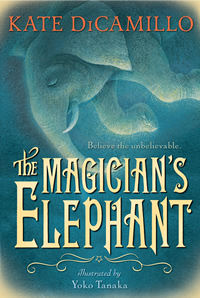In The Magician’s Elephant, the 2009 novel from award-winning children’s novelist Kate DiCamillo, an orphan named Peter Duchene cannot shake the suspicion that his younger sister, who died in infancy, is out there somewhere, still alive. Not true, his guardian Vilna Lutz, has told him again and again. Lutz, a frail and cantankerous old soldier with a beard he combs into an icicle-like point, is determined to mold Peter in his likeness, and that of Peter’s father, a soldier killed in battle. He tells Peter to select old, moldy bread at the market—“Soldiers must become accustomed to rock-hard bread that is difficult to chew,” he says—and commands the boy to march in place and practice maneuvers, orders that Peter despondently obeys.
But after a fortuneteller tells Peter that his sister does indeed live, and that an elephant will help him locate her, the boy begins to follow his doubts and hopes. Sure enough, a magician performing in the city botches a trick, and sends a pachyderm—rather than the intended bouquet of lilies—down onto a noblewoman’s lap, breaking her legs. The elephant, taken into custody along with the disgraced magician, becomes the talk of the town, and Peter’s determination to find his lost sister blossoms.
The Magician’s Elephant is that rarest of creatures—a tale that genuinely works for all ages, imbued with plentiful allegorical potential and dashes of humor to lighten its somewhat somber mood. DiCamillo’s stylized prose, at times almost songlike in quality, and her level of diction (which should provide welcome challenges for ambitious young readers) make this an ideal read-aloud-at-bedtime book, one that can inspire thoughtful discussions about truth, honesty, and belief. Yoko Tanaka’s beautiful illustrations beg for close contemplation: dark yet detailed, they’re the perfect complement to this story set in the darkest and coldest of seasons.
 The Magician’s Elephant is unlike any of DiCamillo’s previous, highly praised novels, among them the Newbery Medal winner The Tale of Despereaux; Because of Winn-Dixie, a Newbery Honor Book; The Miraculous Journey of Edward Tulane, which won the Boston Globe-Horn Book Award; and The Tiger Rising, which was a finalist for the National Book Award. Yet it continues a pattern established in those works: nearly all have featured animal characters who are either heroes in their own right or important agents in helping the human characters come to terms with emotional burdens and learn about the power of love.
The Magician’s Elephant is unlike any of DiCamillo’s previous, highly praised novels, among them the Newbery Medal winner The Tale of Despereaux; Because of Winn-Dixie, a Newbery Honor Book; The Miraculous Journey of Edward Tulane, which won the Boston Globe-Horn Book Award; and The Tiger Rising, which was a finalist for the National Book Award. Yet it continues a pattern established in those works: nearly all have featured animal characters who are either heroes in their own right or important agents in helping the human characters come to terms with emotional burdens and learn about the power of love.
In advance of her reading at DK Booksellers in Memphis, DiCamillo answered questions from Chapter 16 via email.
Chapter 16: You have said, “I wanted, I needed, I longed to tell a story of love and magic.” Why such acute longing for this particular story?
DiCamillo: I’m not sure that the longing was for this particular story, but rather for a story of love and magic. I needed to tell a story to convince myself of possibility and love. Happily, the story of Peter and Adele and the elephant came along just when I felt that need most keenly.
Chapter 16: Allegorically, The Magician’s Elephant can be read as a story about faith and the persistence of belief—whether in a higher power, or the achievement of a goal, or one’s self. Did you have that theme in mind as central to the story—as an important “take-away” message for young readers?
DiCamillo: I never have a theme in mind because if I did I would surely mess things up. That said, I was (gradually) aware of that theme (of faith and persistence) as I did draft after draft of the story and I worked to heighten it, illuminate it. As for take-away: I would be delighted if a kid (or an adult) finished this book and felt more hopeful.
Chapter 16: The question “What if?” is also resonant in the book, which suggests the power of hope, again, but also that of imagination. Do you think children need more encouragement these days to exercise their imaginations?
DiCamillo: Oh, I like that, the notion that the question “What if?” also applies to the imagination. Asking that what-if question is central to the telling of any story. As for kids and their imaginations, I think that the ability to imagine is as present as it ever was. And as necessary as it ever has been, too.
Chapter 16: In the book, there’s a passage about the community’s reaction to the elephant: “They stood together. They waited. And secretly, deep within their hearts, even though they knew it could not truly be so, they each expected that the mere sight of the elephant would somehow deliver them, would make their wishes and hopes and desires come true.” While this story carries a very positive message about hope, this passage seems to home in on a kind of hope that is central to the commodity- and celebrity-focused culture we live in—a hope that can at times be unhealthy. Were you thinking along those lines?
 DiCamillo: Wow, that’s another interesting and powerful insight. And, alas, that thought never crossed my mind.
DiCamillo: Wow, that’s another interesting and powerful insight. And, alas, that thought never crossed my mind.
Chapter 16: Several of your books have been made into or are being developed as feature films, and The Magician’s Elephant is also on that track. How does it feel to see the worlds you conjured brought to life in a different medium? On a related note, has having several books made into films changed the way you write in any way? Do you think about the possibility of the story becoming a film as you write it?
DiCamillo: I’ve always seen the story in my head. Writing is a very visual process for me. So, the whole book-into-movie thing hasn’t changed how I write in any way. But it has been fabulous and interesting to watch my stories get turned into movies. I’ve learned a lot about story-telling and the creative process by seeing that happen.
Chapter 16: As a Newbery Medal winner and author of many highly praised books, what are your thoughts on the e-book and book-app revolution, as it pertains to children specifically?
DiCamillo: Hmmm. I have an iPhone and I have an e-reading device on that, and I must say it is comforting for me to always know that I have a book with me. But that said, I still like to hold an actual physical book. I don’t know what will happen with the kids who are growing up in this electronic world. They might not feel that profound attachment to the physical book.
Chapter 16: I’ve really enjoyed reading your collaboration with Alison McGhee, Bink and Gollie, to my young daughter. Do you happen to know any real-life, precocious children who live in a fabulous, ultra-modern tree house? And might we anticipate more stories about these two?
DiCamillo: Ha. Yes. Where are those kids? Bless them. I would like to meet them, too. Actually, I would like to be one of them. And a new Bink and Gollie comes out next year.
Kate DiCamillo will read from The Magician’s Elephant at DK Booksellers in Memphis on May 13 at 6 p.m.
Tagged: Children & YA





